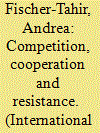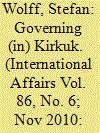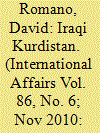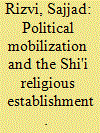|
|
|
Sort Order |
|
|
|
Items / Page
|
|
|
|
|
|
|
| Srl | Item |
| 1 |
ID:
099899


|
|
|
|
|
| Publication |
2010.
|
| Summary/Abstract |
America won an asymmetric war in Iraq and lost an asymmetric peace. Translating material power advantage into favourable political outcomes has been a challenge for great powers down the ages-what makes this bridge even more difficult to cross today is the raised expectations on the part of liberal publics about the moral purpose of US-led interventions. In this sense, Iraq is part of the explanation for why influential liberals believe there is a 'crisis' in America's world leadership. 'America after Iraq' subjects this claim to analytical scrutiny-in particular it addresses whether Iraq was simply a chapter in a longer book detailing American power and purpose in the post-9/11 world? In answering this question the article is drawn to consider conceptual debates about a shift in the international system from anarchy to hierarchy with the US as the hegemonic power. While it rejects strong versions of the hierarchy thesis that imply the Washington is the new Rome, it is nevertheless drawn to an understanding of a hierarchical form of ordering where the US oscillates between a hegemonic role and an imperial outlaw. Seen through this lens, the Iraq War was an intervention that happened because it could, and not because it was just or necessary. Public opinion and the weakness of domestic institutions are also critical factors in explaining how it was possible for a previously status-quo oriented hegemonic power to act recklessly and put the rules and institutions of international society under strain.
|
|
|
|
|
|
|
|
|
|
|
|
|
|
|
|
| 2 |
ID:
099905


|
|
|
|
|
| Publication |
2010.
|
| Summary/Abstract |
After the fall of Saddam Hussein's regime in April 2003 many women supported the process of transition and became active in political parties and coalitions. A wide range of groups were also formed which pursued women's rights agendas and, in many cases, included a call for peace and reconciliation and charity activities for women and children. However, female political action and the field of women's rights remain divided by the same multiple boundaries of belonging which affect Iraqi society itself; women operate in specific ethnic and denominational, local and regional settings, and they support nationalist, secularist, left-wing or Islamist agendas. Women's rights-whatever the direction-can be of major or minor concern.
This article outlines female political action and draws attention to the key issues which are discussed, in particular, by secular feminists in Iraq. In so doing, the article highlights how women in Iraq have not only lost, as a wide range of observers argue, but have also benefited from the restructure of the political landscape. Female political activists are still faced with old and new social, cultural, legal and political obstacles. The article argues that when women support narratives that leave men's superiority untouched, they are not simply victims of men or 'false consciousness'; women either compete and cooperate, or they reject ideological narratives and power relations, while pursuing agendas of individual interest. Yet, despite competition among women and women's groups, and women's loyalty to agendas controlled by men, radical overtones that resist male domination can be heard- and should be supported.
|
|
|
|
|
|
|
|
|
|
|
|
|
|
|
|
| 3 |
ID:
099904


|
|
|
|
|
| Publication |
2010.
|
| Summary/Abstract |
This article focuses on the dynamics of the process of settling the status of Kirkuk, principally within the framework of the current Iraqi constitution of 2005 and the United Nations Assistance Mission for Iraq proposals of 2009, taking into consideration the broader local, national, regional and international context in which such a settlement has to be achieved. The article proceeds in four steps. Beginning with a conceptual clarification of the stakes and remedies associated with territorial disputes, it gives a broad overview of the three principal forms in which such disputes occur and illustrates this with pertinent examples of past disputes and their settlement, using this as an empirical basis for discussing the general dimensions of territorial dispute settlements and the factors that determine their precise nature in different cases. This is the background against which the following section contextualizes the situation in Kirkuk. Based on personal interactions with key interlocutors from all of Kirkuk's communities and key Iraqi and external players and analysts, the article examines the three (im-) balances of grievances, demands and power in and around Kirkuk that are essential for understanding the dynamic underlying any efforts to resolve the dispute in and over the province. Taking as a baseline the options currently available under the 2005 constitution of Iraq and the recommendations of the 2009 UN Report on Disputed Territories, it offers some observations on areas of possible compromise centred on power sharing in Kirkuk and status of Kirkuk vis-à-vis Baghdad and Erbil.
|
|
|
|
|
|
|
|
|
|
|
|
|
|
|
|
| 4 |
ID:
099898


|
|
|
|
|
| Publication |
2010.
|
| Summary/Abstract |
This article argues that American policy towards Iraq went through four major shifts between the invasion in 2003 and the announcement of the surge in 2007. The best way to understand the Bush administration's evolving policy towards Iraq is by examining the ideological parameters within which it was made. The article assesses various approaches to understanding the relationship between ideology, policy making and foreign policy, concluding that ideology shapes the paradigm and analytical categories within which foreign policy is made. A major change in foreign policy originates either from the decision-maker consciously recognizing and attempting to rework the ideational parameters within which policy is made or in reaction to 'discrepant information' or 'anomalies' that destabilize the paradigm and its analytical categories. The article goes on to examine the extent to which both neo-liberalism and neo-conservatism shaped George W. Bush's foreign policy. It identifies a series of major analytical categories that originate from within these two doctrines and shaped policy towards Iraq. The article argues that the four major shifts in Bush's policy towards Iraq were forced upon the administration by the rising tide of politically motivated violence. Ultimately this violence forced Bush to abandon the major analytical categories that, up to 2007, had given his policy coherence. In order to extricate his administration from the quagmire that Iraq had become by 2006, Bush totally transformed his approach, dropping the previously dominant neo-liberal paradigm and adopting a counter-insurgency doctrine.
|
|
|
|
|
|
|
|
|
|
|
|
|
|
|
|
| 5 |
ID:
099903


|
|
|
|
|
| Publication |
2010.
|
| Summary/Abstract |
In August 2010, the United States officially ended the combat mission of its military forces in Iraq and withdrew all but 50,000 of its troops from the country. Iraqi Kurds now contemplate the implications of the looming withdrawal of the remaining 50,000, scheduled for the end of 2011. While Arab-Kurdish relations in Iraq face the risk of serious deterioration, the US military withdrawal will probably not greatly affect the internal politics of Kurdistan. Given the de facto autonomy the region has enjoyed since 1991 and the Kurds' resulting experience with self-rule, Iraqi Kurdistan never suffered from the post-2003 security and political vacuums plaguing the rest of the country. As a result, no more than a few hundred coalition troops were stationed in Iraqi Kurdistan (and no coalition casualties have occurred there since 2003), with governance and security remaining completely in the hands of the Kurdish authorities.
While important centrifugal tendencies do exist in Iraqi Kurdistan and are discussed here, the region will most likely continue to deal with Baghdad and the rest of the outside world with the united voice it cultivated after 2003. US civilian personnel and advisers will also remain in Iraq after the military withdraws, which offers the possibility of assisting Iraqi Kurdistan to overcome obstacles in order to achieve better, more transparent governance. A continuing American diplomatic engagement in Iraq also offers the possibility of helping Kurdistan further institutionalize its autonomy vis-à-vis Baghdad and neighbouring states.
|
|
|
|
|
|
|
|
|
|
|
|
|
|
|
|
| 6 |
ID:
099901


|
|
|
|
|
| Publication |
2010.
|
| Summary/Abstract |
The 'oil question' in Iraq has traditionally been viewed almost exclusively through the prism of ethno-sectarianism. Disputes over the management and licensing of the hydrocarbon sector and over revenue distribution have been seen as a battle for power between Iraq's ethnic and sectarian communities, as if these were monolithic entities. This has led to a conviction-especially among US policy-makers in post-war Iraq-that solving the problem lies in a simple formula of apportioning control of the sector to decentralized authorities and dividing revenue proportionally. This view ignores the fact that disagreements over management of the sector and over revenue distribution reflect a deeper dispute that cuts across ethno-sectarian lines. In reality, disputes are driven far more by the as-yet-unresolved issue of whether ultimate sovereign authority in Iraq lies with the central government or should be decentralized to regional and provincial governments. As the main source of revenue in Iraq, control over the oil and gas sector is critical to the success of these rival agendas. Consequently, compromise has been impossible to achieve, and neither side is willing to make concessions for fear of threatening their long-term ambitions.
Tactical maneuvering by different parties in the aftermath of the recent elections may provide some temporary respite to the oil and gas dispute, as Arab leaders in Baghdad seek to co-opt the support of Kurdish parties to form a new coalition government. But an accommodation over the federalism question in Iraq still seems out of reach. This will not only hamper the legislative process and effective government in the coming years, but could also threaten stability, particularly along the fragile border that separates the Kurdistan Region from the rest of Iraq.
|
|
|
|
|
|
|
|
|
|
|
|
|
|
|
|
| 7 |
ID:
099900


|
|
|
|
|
| Publication |
2010.
|
| Summary/Abstract |
Since the fall of the Ba'athist regime in 2003, the Shi'i religious establishment in Iraq has come to the fore as a signifcant political force, intervening, guiding, supporting and opposing various types of developments. Its prominence has been directly related to the realization that the Shi'a constitute an absolute majority in Iraq and hence would have the primary influence in a democratic state. Alongside the recognition of its importance, some analysts tend to assume that the Shi'a are more inclined than others in Iraq to follow their religious and cultural leadership. This article attempts to clarify a number of issues pertaining to the actual attitudes and relationships between the marja'iyya and politics in Iraq. First, it examines three important approaches to an activist understanding of the role of the marja'iyya in politics and comments on the actual political movements that arise from them. Second, the article analyzes the role of the paramount fgure in the marja'iyya in Najaf, Ayatollah Ali Sistani and his attitudes towards politics and some of his active interventions in Iraqi politics. Finally, it comments on outstanding problems and failures within the leadership of Shi'i politics and the limitations of the marja'iyya in promoting democratic and civic politics. Any political actors in contemporary Iraq must take cognizance of the role of the marja'iyya but also account for the deficits that need to be overcome to propel Iraq beyond a compromise of ethnic and confessional affliations.
|
|
|
|
|
|
|
|
|
|
|
|
|
|
|
|
| 8 |
ID:
099897


|
|
|
|
|
| Publication |
2010.
|
| Summary/Abstract |
The withdrawal of US combat forces presents new challenges and opportunities for Iraqis over the coming months and years. This special issue of International Affairs seeks to provide an assessment and analysis of many of these challenges and opportunities from the perspective of Iraqi actors, while also considering the interests of the wider regional and international community. Iraq remains important, fundamentally so. The main challenges that now face Iraqi leaders are not of recent origin but have never been fully confronted-to some degree the US presence has acted to ameliorate tensions at difficult times and helped to find compromise solutions that have left situations calm but also put on hold. The articles in this special issue focus on a range of these challenges, questioning orthodox views on Iraqi political development and considering the possibilities that lie ahead. They present not only 'post-American Iraq' but also 'post-Iraq America'. By facing these challenges successfully, political, economic and social opportunities clearly unfold. These opportunities, if exploited to the full, would see Iraq's security become normalized, its economy and social structures repaired, and the prominence of the country in international affairs as a constructive rather than destructive force increased. However, the reverse of this is also starkly apparent. The failure of Iraqi leaders to meet the challenges may present very serious problems in the near future-problems possibly made all the more severe due to the lack of a US military presence and the perceived weakening of US will to impose itself on the political direction of the country.
|
|
|
|
|
|
|
|
|
|
|
|
|
|
|
|
| 9 |
ID:
099906


|
|
|
|
|
| Publication |
2010.
|
| Summary/Abstract |
Iraq has not enjoyed regular foreign relations since 2003, and arguably for several years before. Looking ahead, Iraq is now in a position to develop its foreign relations fully, yet how these relations will be constructed remains unclear. As with all states, Iraq's foreign policy remains conditioned by geopolitical factors- and in particular control of resources, access to waterways, and its geographical location between the Arab world, Turkey, and Iran. There are also the legacies of the Ba'athist regime to consider-and especially the way foreign policy was constructed, and how 'foreign' was defined in terms of foreign to the regime, rather than to Iraq. Layered on top of these geopolitical determinants and legacies is the reality of the post-2003 state. With the removal of the structures of the Ba'athist regime and the emergence of new political elites under the guidance of the US, Iraq's foreign relations are now clearly different, yet some of the patterns of the past still remain very much in place.
|
|
|
|
|
|
|
|
|
|
|
|
|
|
|
|
| 10 |
ID:
099902


|
|
|
|
|
| Publication |
2010.
|
| Summary/Abstract |
The disputed internal boundaries in northern Iraq between the Kurds and the Arabs have been a persistent fault-line in the state's history and have rapidly emerged as a core dispute since the 2003 invasion of Iraq. The Kurds underwrote, more than any other constituency, the democratic project in the new Iraq and contrived an ambitious constitutional route through Article 140 to place Kirkuk and other disputed areas under the administration of the Kurdistan Regional Government (KRG) by December 2007. Article 140 was designed to resolve the issue in the Kurds favour once and for all, to circumvent yet another tedious negotiation round with the Arabs and to quarantine the Kurdish project from regional interference, particularly Turkey. On all three counts the strategy failed. This is primarily because of the complexity of the issue but there is also evidence of internal Kurdish discord with the strategy concerning the restoration of Kirkuk governorate's boundaries. The years 2007-2008 were a watershed for Kurdish designs to incorporate Kirkuk through a constitutional process and since then the disputed boundaries question has been left in a state of suspended animation.
However, if a negotiating framework were to emerge the contours of a 'deal' have begun to crystallize and there is scope to move from management of the issue to resolution. Answers to the questions of when and how will depend on the shape of the complete package, the new government constellation and the extent that Turkey and Iran reveal themselves in the political marketplace.
|
|
|
|
|
|
|
|
|
|
|
|
|
|
|
|
|
|
|
|
|